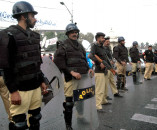Building The Reluctant Fundamentalist
Mohsin Hamid speaks to students about the process of writing a novel.

While there have been varied and contradicting readings of the book, almost every one agrees that the primary tone of the book was one of control, something Hamid told the Lahore University of management Sciences’ (Lums) students, he worked hard to achieve.
Hamid, now based in Lahore, wrote The Reluctant Fundamentalist during his stay in New York in 2001. He said that the location greatly informed his writing. Following the phenomenal success of his first novel Moth Smoke set in Lahore, his second work was about a Pakistani youth, Changez, working in corporate America who becomes disillusioned and feels he is somehow serving the US corporate agenda and ought to return to his roots in Pakistan.
“I was experiencing all those emotions myself and it spurred me to explore it further in the novel,” he said, adding that he had finished the book before September 11.
“I was in the middle of edits when the attacks on the twin towers happened. Suddenly, I was a Pakistani Muslim living in New York after September 11,” he said, adding “There was no way the novel or I could dodge that.” Hamid said that after the attacks his introspective book suddenly became part of a much larger narrative that was being pulled apart from all sides.
“I knew that I couldn’t avoid it. I knew no matter what I did, it would be set against the time in which it was released so I began to rework it,” he said.
During his talk, Hamid elaborated on the process of writing a novel for the author. He focused on the architecture, construction and design of The Reluctant Fundamentalist rather than on the content and interpretation.
“As a novelist, I think of both my books as ‘buildings of the mind’. It is not my job to design a journey that has set junctions. The reader should be able to go wherever they want; whenever they want within the premise I have created. I like that fluidity,” he said.
Hamid said that one of the reasons why he did not want to define the themes he explored in the book was because the “fanatic’s politics” is not black and white.
“We tend to think that the discourse behind terrorism and all this ‘stuff’ is cut and dried when it is anything but. It isn’t as simple as ‘they are evil’, especially not when one goes into the background,” he said. “I did want the title to grab the reader to a book, which is more about fear than anything else.”
“I wanted to explore fear rather than terrorism.” he said. The dialogue between the American marine and the Pakistani over a cup of tea encompasses all this. It lasts nearly 10 hours.
“There are lots of gaps for the reader to fill in, which is the way I like it. People talking about politics and drawing political themes into my book is often more a project of their own politics than that of the book. The way they read the book is the way they think,” Hamid said.
Perhaps one of the defining features of the novel is its precision. It has 12 chapters which are 12 pages each. “I knew I wanted to keep it short, it is extremely structured,” Hamid said, adding “I wanted people who were intrigued by the title and those that were turned off by it to both pick it up and discover that it wasn’t about what the title trumpeted.” Hamid said he originally wrote over 1,000 pages of manuscript that ended up as a 180-page novel.
Recent reports that director Mira Nair wants to direct a movie based on the book seem to wash over Hamid, who says that while he would be honoured, he didn’t really concern himself with how his work was interpreted in other media. “That is something inspired by something I did, not what I did. I like to keep those two places separate.”
Published in The Express Tribune, November 27th, 2010.



















COMMENTS
Comments are moderated and generally will be posted if they are on-topic and not abusive.
For more information, please see our Comments FAQ